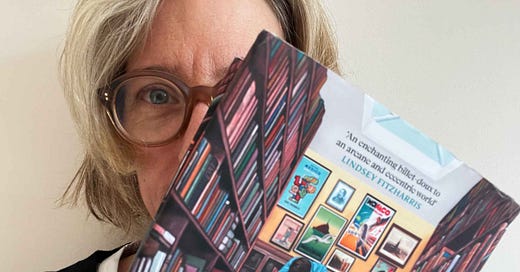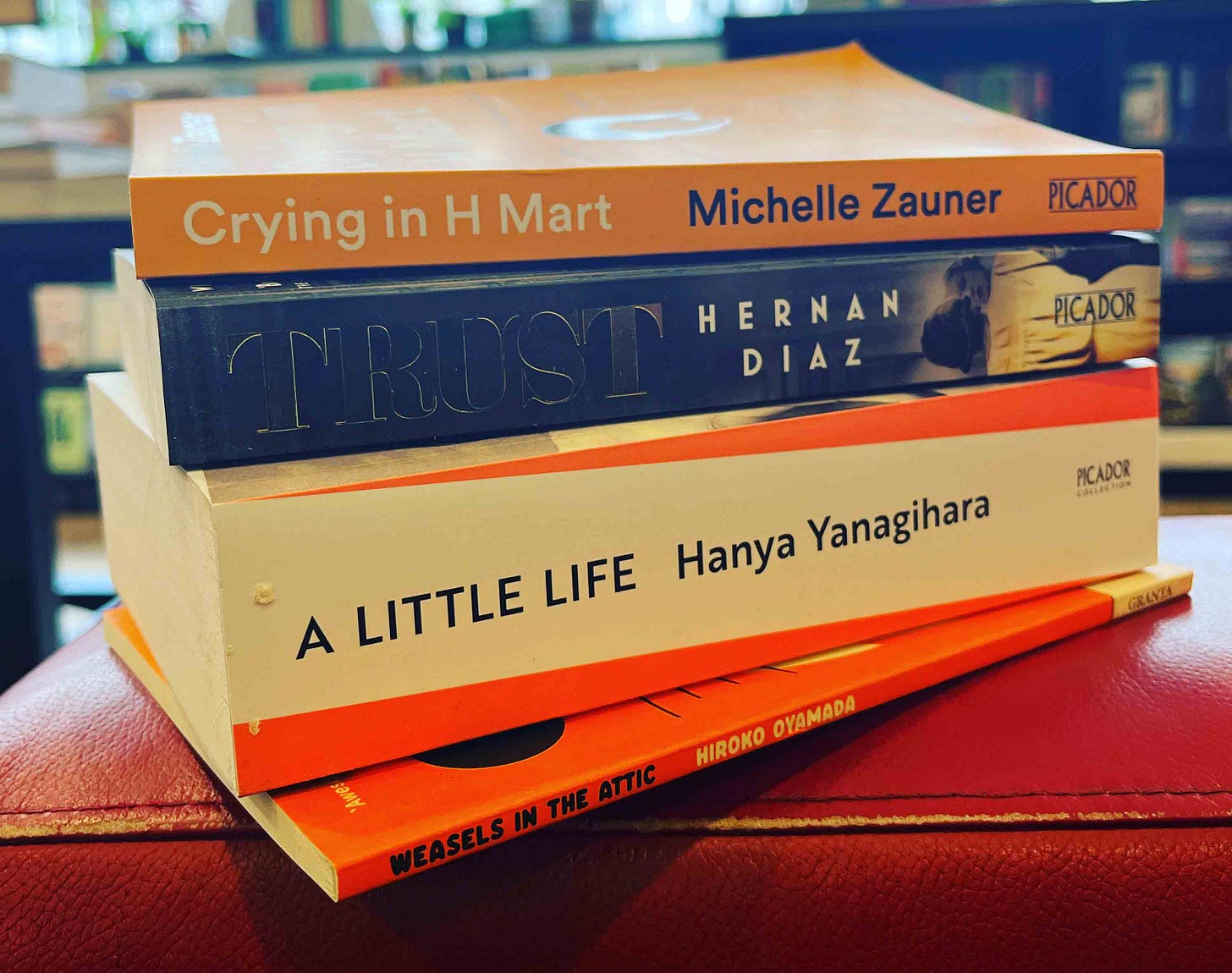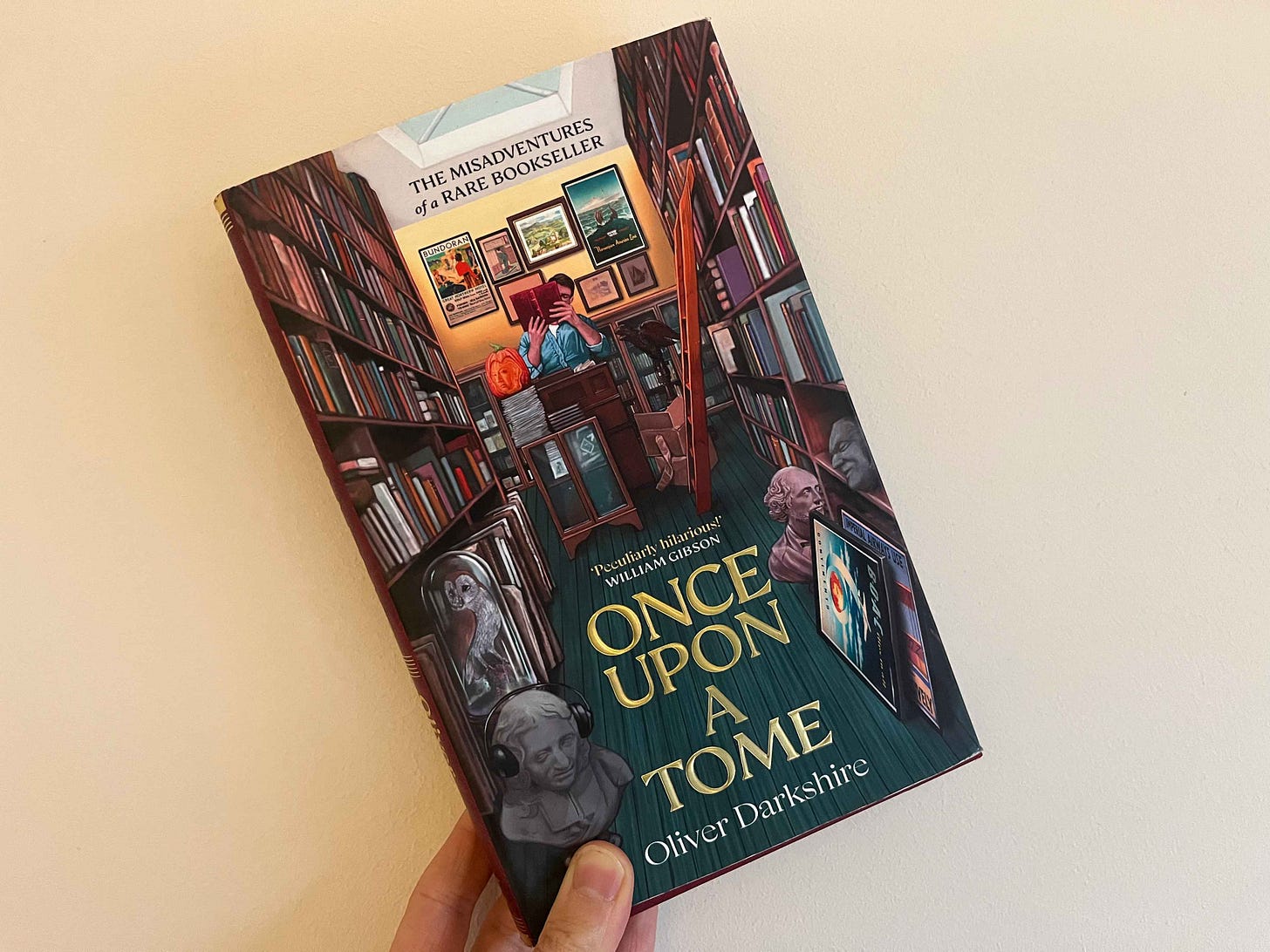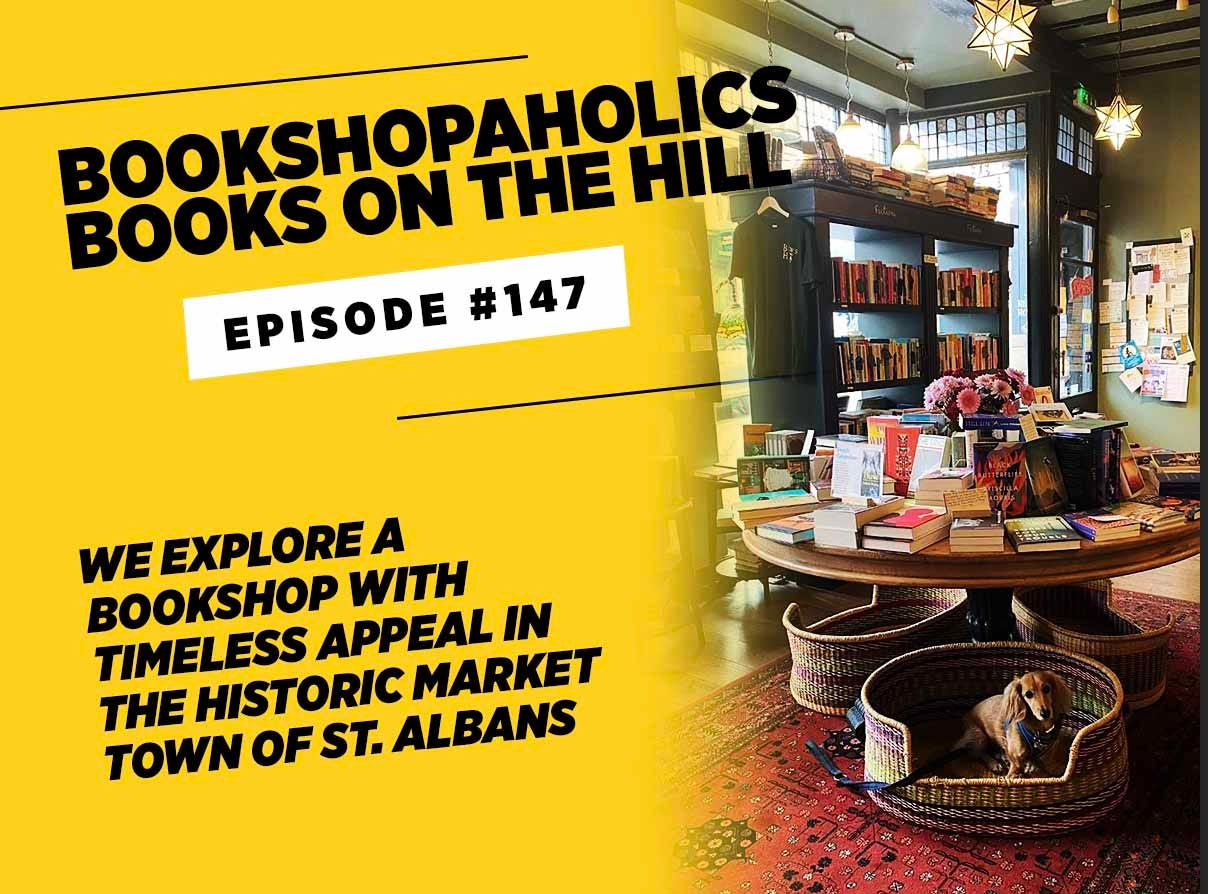The unsatisfied smell of old books
A new book about old books, dipping into some first chapters and we go book-shopping on the pod
One of the delights of the reading life is that you never know what’s going to come along. Books that you’ve had sitting on your shelf for ages may turn out to be sleeper hits once you actually take them down and read them. This is where I realised the value of the first chapter read - that way at least I have some idea of what’s waiting for me. But it’s more subjective than that, even - sometimes I think you have to be in the right frame of mind to appreciate a book. I wasn’t quite in the right zone the first time I tried to read Once Upon a Tome, Oliver Darkshire’s on-the-job memoir of life at Sotheran’s antiquarian bookshop. The second time I picked it up I gently slapped the forehead of earlier self for not having seen it for what it is, a work of comic genius. Anyway, more of that below under ‘book of the week’. But first, some first chapters…
First chapters
I think I can now elevate this bit of the newsletter to ‘Regular Feature’: accepting the impossibility of reading all the books there are in the world, I decided instead to cultivate the habit of sampling them via their opening chapters. Read on for this week’s selection.
With 20,000 books published each year a sense of having missed one or two is inevitable. Of the tiny proportion of those books I actually know about, some I read and the rest I’m happy to let flow downstream. Occasionally, though, there are books I feel I really ought to have read, and that maybe I’ve missed out on. And so this week’s first chapters is devoted to three that slipped through the net.
Crying in H Mart by Michelle Zauner
One of the buzz books of 2021, this was definitely on my radar but I didn’t read it while the buzz was on, and later I confess I forgot about it. A follower, though, in answer to the question ‘You’ve been kidnapped! 2 hours later you’ve been returned because you can’t stop talking about ______’ responded with Crying in H Mart, saying it had really stayed with him. Maybe it helps if you know that Michelle Zauner is lead singer of an indie band called Japanese Breakfast (who may not have known the way to my heart was this X-files inspired video, but it so was!). Before looking them up, however, this wasn’t something that meant anything to me. And so I opened the cover preconceptions free.
What’s it about? No handy description from the publishers so I turn instead to the pull-quotes: ‘Highly evocative (smells seem to steam off the page), a vivid combination of reflective essay and memoir – but essentially an homage to her mother. What emerges, however, is the complexity of their relationship and the ambivalence of her feelings – her mother is a mixture of tough love, a hard task-master and devoted parent to her only daughter, who was always seeking ways to get her approval. Food, death, love, marriage, family, identity and art are just some of the preoccupations in this often moving self-portrait.’ – the Sydney Morning Herald
First line: ‘Ever since my mom died, I cry in H Mart.’
How was the first chapter? I found this a surprisingly emotional read. My mother is alive and well, but I have experienced loss and know well how uncertain life can be. Reading about death and grief has a tendency to remind me of the precarious nature of existence, which isn’t always something I want to curl up with. On the other hand there are truths here that sometimes feel like the only ones worth knowing, and I don’t always mind the reminder. Around all this is her wonderful, vivid writing about the Korean food Zauner’s mother taught her to love, her family, and her life as someone who grew up in America and speaks only basic Korean, and yet has a keen sense of identity and belonging that makes the loss of her ties to her mother country all the more heartbreaking.
Desire to read on: I’m actually not sure this one is for me right now, but I feel certain from the bit I’ve read it would be a fascinating, thoughtful and moving read. I’m glad to have experienced a bit of it. I can see why it had the impact that it did.
Trust by Hernan Diaz
A stone I definitely left unturned – I would have read this, except I was so sure it would make the 2022 Booker shortlist I held off, and then when it didn’t I got swept up in Booker reading (and then after I’d done all that I was allergic to any more Booker reading). Lauren Groff calls it ‘radient and profound’ while the Telegraph’s reviewer writes ‘Destined to be known as one of the great puzzle-box novels, it’s the cleverest of conceits, wrapped up in a page-turner.’
What’s it about? A Wall-street tycoon and his young wife rise to the top of New York society in an age of excess and speculation. But now a novelist is threatening to reveal the secrets behind their marriage, and this wealthy man’s story – of greed, love and betrayal – is about to slip from his grasp. Composed of four competing versions of this deliciously deceptive tale, Trust brings us on a quest for truth while confronting the lies that often live buried in the human heart.’
First line: ‘Because he had enjoyed almost every advantage since birth, one of the few privileges denied to Benjamin Rask was that of a heroic rise: his was not a story of resilience and perseverance or the tale of an unbreakable will forging a golden destiny for itself out of little more than dross.’
How was the first chapter? Yep, I was quite happily absorbed. Didn’t feel like a story where I was going to get to know the main character. In fact I’d say everything about the first chapter is designed to intrigue you and keep you reading. So far it seems like an easy success story, so why, you wonder, is the author so interested to tell it? I also, slightly perversely as person who doesn’t understand numbers and banking AT ALL, love reading about finance. So that held my interest.
Desire to read on: Everything I know about this book suggests it is something I will like. Would it alarm you to learn I’m auditioning it for our first podcast book club in September? My idea is that we’ll do newish books in paperback, so that there’s a good chance people might already have read things or, like me, maybe they missed them in hardback or held off waiting for the paperback to come out. If I proposed a 400-page Pulitzer winner would that make everyone run a mile? The Sunday Times does reassure us that it’s ‘massively enjoyable’…
A Little Life by Hanya Yanigahara
Ok, so I’ll admit the fact that I haven’t read this one has become a little pointed on my part. I’m slightly allergic to books that mean That Much to That Many people, and also as someone who sobs at the least provocation I’m defensive in the face of emotional manipulation. Friend-of-pod Phil Chaffee describing it as a contemporary Passion Play also made me wary (knowing something about those as I do). And yet, and yet – it’s such a culturally resonant book, not even to have looked at it feels like a weird omission. And so join me as I go from someone who hasn’t read it, to someone who has read the first chapter.
What’s it about? As if you didn’t know! Ok, it’s about four graduates who move to New York, ‘broke, adrift, and buoyed only by their friendship and ambition. There is kind handsome actor Willem; the sardonic painter JB; Malcolm, a frustrated architect; and the brilliant yet enigmatic Jude, who serves as their centre of gravity. Over many decades, their complex relationships come to be defined by their respective addictions, successes and traumas, in this immensely powerful novel of love and the limits of human endurance.’
First line: ‘The eleventh apartment had only one closet, but it did have a sliding glass door that opened onto a small balcony, from which he could see a man sitting across the way, outdoors in only a T-shirt and shorts even though it was October, smoking.’
How was the first chapter? I cannot deny I was interested. What I love is the sense of a slow burn, the idea that these young men are at the start of their lives and you’ll get to see how they, and their relationships, unfold over time. It feels immersive and while I wasn’t particularly struck by the writing I didn’t dislike it either. There was a good joke about a typeface on page 10 that sharpened my interest. But there’s so much detail here, probably every single person who reads this book will have that moment of knowing recognition at some point. So I suppose the question really is, could I be in it for the long haul?
Desire to read on: Moderate to fair. I have a feeling if I ever do find myself with time on my hands I might well come back to this.
Weasels in the Attic by Hiroko Oyamada
The cover, plus the fact that Patti Smith thinks it ‘Awesome’, allied to the fact that I don’t just like to go and sit on Waterstones’ red sofa and avail myself of their book collection without buying anything meant that this was the book that came home with me. ‘Two friends meet across three dinners. In the back room of a pet shop, they snack on dried shrimps and discuss fish-breeding. In a remote new home in the mountains, they look for a solution to a weasel infestation. During a dinner party in a blizzard, a mounting claustrophobia makes way for uneasy dreams. Their conversations often take them in surprising directions, but when one of the men becomes a father, more and more is left unsaid.’ My worry is there won’t be enough about weasels. I’ll report back.
Book of the week
‘It’s not that booksellers are dirty, per se, because by and large we are not. There is, however, a weathering of the soul that comes with the profession, a sort of fraying at the edges which is visible even if one has managed to find a half-decent tie being used as a bookmark inside A History of English Craft Bookbinding. With time and exposure to books your average antiquarian bookseller slowly loses any shiny veneer they once possessed, leaving behind something that’s a bit shabby but very authentic.’
It’s true, I am late to every party due to mostly going around with my head stuck in the pages of a book and so – even despite the fact that X informs me I’ve been following them for ages – I hadn’t noticed how brilliant and perfect were the tweets coming from the Sotheran’s account (we’ll come back to why this is relevant later). Separately, as I gathered books for my ‘reading books written by booksellers’ project (something that’s rapidly turning into Causabon’s Key to All Mythologies) I’d acquired and started Once Upon a Tome. When I first picked it up I thought it was a parody. I just didn’t twig to the fact that Oliver Darkshire in fact seems to represent his working environs with perfect truth from his own, very specific point of view. And what a view that is. Once it clicked for me I was in love with every word.
It’s a particularly rich example of that genre of books I think of as ‘what I did at work today’. After attempts at a couple of other careers Darkshire ended up at Henry Sotheran’s where he accepted the role of apprentice bookseller. Gradually he learns the trade, his guides being Andrew, the Managing Director (special skill: remaining serene in the face of chaos), James (master of the art of knowing exactly how long to leave a customer with a book before prodding them in the direction of buying it), Georg (king of travelogues), Rebekah (queen of the Modern First Editions) and Evelyn (keeper of the records). We also learn about collectors who can be divided into Draculas (who obsessively collect books on one particular subject) and Smaugs (omnivorous collectors who love to build their hoards). We also discover that in addition to book-buyers the bookshop is visited by cryptids (often elderly, hard to dislodge), The Spindleman (a character ‘with hair like straw and the temper of Rumpelstiltskin’) who turns up and attempts to sell books, a woman known as The Ancient who is older than time and something called ‘The Ristlestig’ which is Darkshire’s name for ‘whatever is living in the packing cellars’.
There’s not really a plot as such, just vignette after vignette, each one fascinating. It did make me laugh out loud a couple of times. Otherwise I mostly read it with an inner smile of deep appreciation and enjoyment. If you like your book industry memoirs to come with a touch of dungeon master this is absolutely for you. Finishing it and feeling slightly forlorn that the only option for more was to read it all again, I then twigged that Darkshire is behind the Sotheran’s Twitter account, and there, sure enough it turns out there are five year’s worth of tweets. Enough to keep anyone going until he writes another book.
Notes
I enjoyed this episode of the BBC’s A Good Read where they talked about The English Understand Wool by Helen DeWitt, a favourite of mine.
I do love an Emily Temple round up. Of 548 books she tracked, find out which ones topped the critics’ summer reading recommendations.
Thanks to Yuki Tejima, @booknerdtokyo over on Instagram, for posting about the private library of Yoshitaka Haba, a renowned book director/curator known for curating the bookshelves of cafes, clinics, public spaces and institutions in Japan. ’The concept of this space’, she writes, ‘which is located about an hour’s bus ride (plus a 15-minute walk) from the center of Kyoto, is to slow your thinking, remind you to take that breath, enjoy the silence and lose yourself amongst the carefully curated shelves.’
I then discover Yoshitaka Haba has curated the library of Japan House here in London. There’s a lovely short film in which he talks about the value of books at a time when everything competes for our attention.
I love doing these Bookshopaholics episodes. They are the biggest treat for me because I get to do four of my favourite things; be in a beautiful bookshop, chat to the people that work there, browse the shelves and get recommendations. In this episode I visited Books on the Hill in St. Albans, a beautiful, characterful space with timeless appeal. I met the mother and daughter team who run it, and found out some of the challenges they’ve had to overcome (opening just before lockdown being one). Theirs is a close-knit community and it felt very special to be invited in. We agreed that there’s nothing finer than a bookshop ghost, and happily they have not one but three. We also pulled down some recommendations from the shelves, old and new. So listen in, and if you’re in the area, don’t miss a visit. They also have a wonderful reading room upstairs where you can enjoy coffee and cake (as if it could get any better, I know!).
Currently reading
Laura is paused on Lonesome Dove, the 800pp Western that Kate and the rest of the world rave about. She likes it … she’s just not feeling hugely compelled to keep reading for another 500pp. Luckily for her, it’s not a choice. She selected it as her book club’s summer read so she’d best make it across the finish line.
Kate is reading The Death of Ivan Ilyich by Leo Tolstoy. Nicholas Lezard writing in The Guardian calls it ‘one of the most lacerating works of literature ever written, a hard, pitiless stare into the abyss, not just of death, but of human nature.’ I’m not recommending it for the beach. I did enjoy this article by Mary Beard in the New Yorker, and, in particular, learning more about Tolstoy’s translator, Peter Carson who apparently as part of his job as editor-in-chief at Penguin used to read three novels in an evening and six on weekends (!).










A Little Life is definitely one that I still need, and want, to get to!
Awesome stuff as always 👌🏽